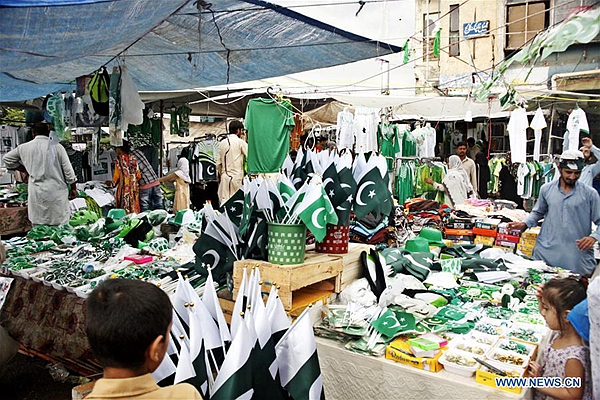Seventy years of unalloyed hatred
- By Sajjad Malik
 0 Comment(s)
0 Comment(s) Print
Print E-mail China.org.cn, August 14, 2017
E-mail China.org.cn, August 14, 2017
|
|
|
People buy souvenirs at a market on the eve of Pakistan's Independence Day in Islamabad, capital of Pakistan, Aug. 13, 2017. Pakistan will celebrate Independence Day on Aug. 14. (Xinhua/Saadia Seher) |
It was 70 years ago, at the stroke of midnight between August 14 and 15, 1947, British rule in India ended and the two sovereign states of India and Pakistan were born. It was not a natural birth, however, rather a kind of Caesarian operation where the pain has continued for seven decades.
India was historically a heterogeneous society that evolved over centuries by absorbing invaders and adventurers. Muslims first arrived in the 8th century; however, they had no political power before the 12th century, but from then on gradually becoming the rulers over the vast sub-continent until the middle of 19th century with varying degrees of political influence.
The British were the last imperial power to land in India and slowly carve out a position by exploiting the local conditions. They were better armed and technologically advanced. Hence, they completely subjugated the country after defeating the last Muslim ruler of Delhi in 1857.
India's fundamental problem has long been tension between Hindus and Muslims. There were periods when it was at a low ebb in the reigns of more humane kings and rulers, but it was always there.
This tension increased from the third decade of the 20th century after political reforms by the British opened up avenues for local leaders to join representative assemblies. As the country moved towards independence, relations between the two communities deteriorated fast.
The Muslims found a great leader in Mohammad Ali Jinnah, a rich westernized lawyer, who was well versed in constitutional democracy and used his professional skills of an advocate to convince the British government that the only solution to the Hindu-Muslims problem was division of the country on religious lines.
The British agreed, as did Hindu leaders after some hesitation. It was hoped that as a Hindu majority and a Muslim majority countries, India and Pakistan would live in peace. Alas, it didn't happen.
It was a time of chaos and uncertainty. Unsure of their fate in the newly-independent countries, millions of Hindus, Sikhs and Muslims started moving to areas where their co-religionists were in majority.
At this moment, centuries old communal hatred and anger erupted in mass riots. Millions of people of all faiths were massacred. An unknown number of women were raped or forcibly taken away. It was butchery and wantonness on an unparalleled scale.
The two countries were still grappling with the legacy of mass murder and vast migrations when the first war broke out between them over the issue of who owned the Himalayan region of Kashmir.
Since then, they have fought three major wars and have been involved in several limited conflicts including the Kargil incident in 1999 that brought them to the verge of nuclear exchange. Exchanges of fire between the armies in disputed Kashmir is an almost daily routine.
After the war of 1965, the two sides cut people-to-people contacts that have still not been fully restored. Unusually in this day and age, they issue city-specific visas and visitors have to report at local police stations wherever they go.
The hatred is institutionalized and hardly anyone can talk about normalization. There are groups and individuals on both side of the border that feed on this endless venom, branding as traitors anyone who talks of peace.
At state level, both countries officially blame each other of involvement in terrorism.
Even strategically, they have different allies. Pakistan was close to the U.S. during the Cold War and India snuggled up to the USSR. Now, India has developed close ties with the U.S., while Pakistan favors China.
The enmity is so deep that though they were granted freedom at the same time, they celebrate it on different dates. Pakistan observes its Independence Day on August 14 while India celebrates it on August 15. Even their missile and weapon systems are named after warriors who inflicted pains and defeats on the rival community.
In the age of digitalized media, every evening, macho-style super patriotic anchors appear on private TV channels and berate the opposite side in talk shows, while aging "experts" nod in agreement.
As the two countries celebrate the 70th independence from Britain, their rulers, TV anchors, defense experts, businessmen and even common people should think how many more years they learnt to respect each other -- I don't expect them to love each other.
Sajjad Malik is a columnist with China.org.cn. For more information please visit:
http://www.china.org.cn/opinion/SajjadMalik.htm
Opinion articles reflect the views of their authors, not necessarily those of China.org.cn.







Go to Forum >>0 Comment(s)